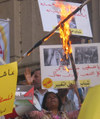Katrina Style Government for Lebanese Americans
Posted by Lorelei Kelly
Why is it that other countries are or have already evacuated their people from Lebanon but the USA is just getting around to it? Australia had close to the amount of people in Lebanon that we have...and they are all out. Sweden can do it, Italy can do it, Greece can do it, why even a small place like Peru has gotten their people out. ...why can't the US?
Senators Levin, Kennedy and Reid wrote to Rumsfeld and Rice yesterday on stepping up evacuation efforts:
While we're at it. What has taken us so long to drop
everything and get the hell over to the Middle East to stop this
violent escalation? Our president too busy giving creepy frat boy massages to female heads of state? (advice to Ms. Merkel: um. RUN! He
will be gone in two years).
Thousands
and thousands of Lebanese refugees now exist--fleeing a country that
was (hopefully still will be) our friend, that was trying to be democratic.
Yes, Hezbollah is horrid. But we are going to have to learn to deal
with non-state groups that we don't like (and groups that are
democratically elected that we don't like i.e. Hamas) in our post 9/11
world. Everyone from the Marine Corps to
Peace Studies Departments is trying to figure out the art and
science of stability without mass violence. Of calculating ill- consequences
into decision making when it still matters. Of avoiding that CIA thing called blowback.
Hezbollah did instigate this round of violence, but Israel's
response, overwhelming city-destroying bombing campaigns, is a long-term
strategic mistake. If ours and Israel's regional grand strategy, from
Iraq to Lebanon to Iran is helping individuals choose citizenship over
extremism, responsibility to society over violence-defined identities,
then we are driving them in the exact opposite direction. Airpower is
an over-hyped idea leftover from World War II. It seems as though the
myth would somehow be busted by now: that peoples suffering the ruination of their cities and death will somehow get
organized and overthrow their leaders? WHAT? Doesn't work. Never has.
Why? Not because the people are stoic, not because they like their leaders.
Its because THEIR LEADERS DON"T CARE WHAT THEY THINK. The leaders of
Germany, Japan and Italy didn't care in the 1940's. Hezbollah doesn't
care today. They have other priorities. They are obviously willing to risk collective punishment of the
Lebanese citizenry.
Why? Because right now, Israel is recruiting the ranks of Hezbollah for years to come. And we're helping.





